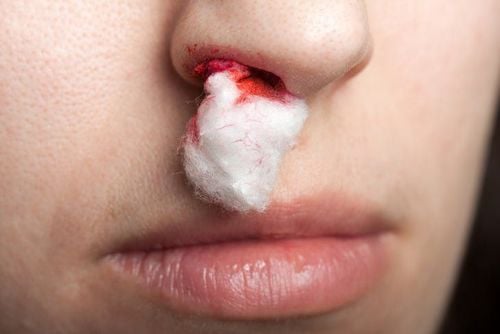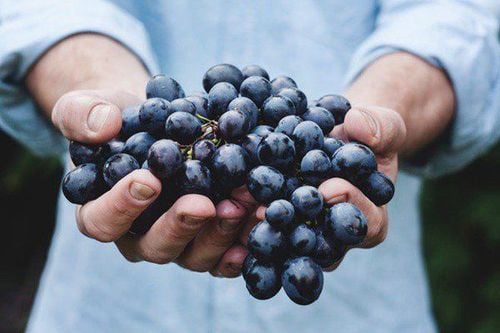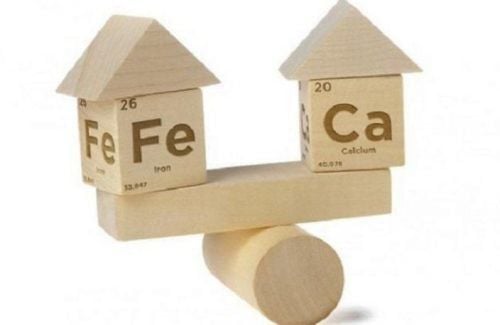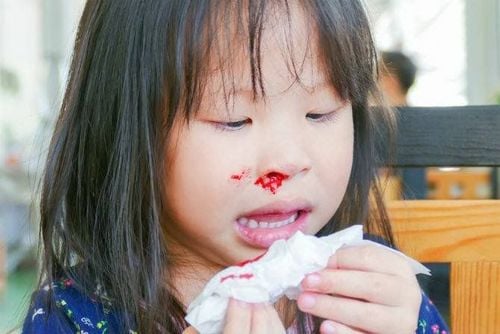Nosebleeds can be caused by infection, trauma, allergic reactions, nose picking, or having a foreign object pushed into the nostril. Nosebleeds are common in children and are usually not serious. So what is the deficiency of a child with a nosebleed?
1. Characteristics of nosebleeds
1.1. What is a nosebleed?
Nosebleeds or epistaxis are a loss of blood from the tissues in the nose. It can easily happen because of the position of the nose and the proximity of the blood vessels in the nasal mucosa to the surface. Usually, nosebleeds are not serious.
1.2. How do nosebleeds affect you?
The nose has many blood vessels that help warm and humidify the air you breathe. These vessels are close to the surface, so they are easily injured - which can cause nosebleeds. However, sometimes nosebleeds are more serious. They originate from the large vessels at the back of the nose. Nosebleeds from these large vessels often occur after trauma, in children or the elderly. Usually, the older the patient, the more severe the nosebleed.

2. Are nosebleeds due to nutrient deficiencies?
Nosebleeds occur when small blood vessels in the nose rupture and bleed. Most cases of nosebleeds often have no clear cause. If you have frequent nosebleeds, it may be due to the following reasons:
- A dry climate or dry, hot air makes your nose dry, causing your blood vessels to gradually become sensitive and may rupture;
- Picking your nose, rubbing your nose or rubbing too hard;
- Chemical irritants such as ammonia; cocaine; aspirin;
- Colds;
- Blowing your nose repeatedly and too hard;
- Allergies, infections in the nose, throat and sinuses;
- Due to trauma to the nose;
- Allergies or allergy medications that can dry out the nose;
- Straining during going poop, constipation;
- Deviated septum;
- Use of certain medications such as anti-inflammatory drugs and nasal sprays;
- Head and face trauma; use of certain blood thinners; Bleeding or blood clotting disorders.
Some other less common problems with nosebleeds include: Alcohol use; Immune thrombocytopenia (ITP); Hereditary hemorrhagic telangiectasia; Leukemia; Nasal and nasal tumors; etc. If your nosebleeds do not stop or you have a lot of bleeding from your gums, you should see a doctor to check your condition.
So what is the lack of nutrients that causes nosebleeds in children? That is when the child's body lacks vitamin C, vitamin K or minerals involved in blood synthesis such as iron, potassium is also the cause of nosebleeds or unscientific nutrition and the child has the habit of picking his nose too hard will cause the child to have a nosebleed. In addition, strong collisions or dry, cold weather make the nose dry and prone to peeling and bleeding. Therefore, a scientific diet and lifestyle have a great impact on preventing and treating nosebleeds in children.
3. Can nosebleeds be prevented or avoided?
3.1. Prevent nosebleeds
- Keep your child's nails short to limit nasal trauma and prevent nose picking.
- Counteract the drying effects of hot indoor air by using a humidifier at night in your bedroom.
- Open your mouth when you sneeze.
3.2. Treat nosebleeds
When your child has a nosebleed, try to stay calm. Almost all nosebleeds can be treated at home.
- If you have a nosebleed, sit down and lean slightly forward. Keeping your head above your heart will slow the bleeding. Lean forward so the blood flows out of your nose instead of down the back of your throat. If you lean back, you may swallow the blood. This can irritate your stomach.
- Use your thumb and index finger to pinch the soft part of your nose together. This is the area between the end of your nose and the hard bone that forms the bridge of your nose. Hold your nose until the bleeding stops. Do not wait at least 5 minutes. If bleeding continues, hold the area for 5 to 10 minutes.
After the bleeding stops, wait a few hours before doing anything that might start the bleeding again, such as bending over or blowing your nose.
3.3. Living with Nosebleeds
Nosebleeds can be annoying. They come suddenly, often without warning. They are usually harmless.

4. Diet to prevent nosebleeds
4.1 Supplement vitamin C
A lack of vitamin C not only makes children's immune systems less healthy but is also a common cause of nosebleeds. Therefore, foods rich in vitamin C will be at the top of the list of foods that children with nosebleeds should eat a lot.
Supplementing enough vitamins for a long time will help increase blood vessel strength, limit damage that causes nosebleeds or bleeding conditions due to other injuries. Supplements from natural foods also meet this need, especially fruits rich in vitamin C including tangerines, oranges, bell peppers, guava, blueberries, strawberries, grapefruit, etc.
4.2. Supplementing Vitamin K
If Vitamin C has the role of strengthening blood vessels, Vitamin K is a constituent component that stabilizes the blood clotting process. Children with blood clotting disorders will often have nosebleeds and are at high risk of liver and bile diseases, heartburn, celiac disease, etc.
Foods that are rich in Vitamin K should be supplemented, including kale, asparagus, cauliflower, basil, spinach, cabbage, etc.
4.3 Supplementing Iron
Children with iron deficiency are not only prone to nosebleeds but also prone to anemia and many other health problems. Therefore, in the child's diet, it is impossible to lack foods that supplement this mineral such as:
- Red meats: goat meat, beef, etc.
- Seafood: shrimp, Tegillarca granosa, crab, etc.
- Nuts and whole grains or molasses
4.4. Potassium Supplement
The human body does not need too much potassium, but there can still be a deficiency due to an unsuitable diet. This trace element participates in the process of regulating blood circulation. Therefore, when this condition occurs in young children, the risk of dehydration and reduced capillary moisture will lead to the rupture of small blood vessels in the nose.
Here are some potassium-rich foods that parents should feed their children when they are deficient in potassium, including fish, clams, green vegetables, yogurt, bananas, avocados, tomatoes, carrots, etc.
4.5. Adequate water intake
Lack of fluid or moisture can cause dryness in the nose and nosebleeds. Therefore, ensure adequate water intake every day. These types of water can come from filtered water or fruit juice, soups, etc.
The above is information about nosebleeds that you need to know clearly to know how to handle them and should supplement a suitable diet to limit bleeding the next time.
Follow the Vinmec International General Hospital website to get more information about health, nutrition, and beauty to protect the health of yourself and your loved ones in the family.
To arrange an appointment, please call HOTLINE or make your reservation directly HERE. You may also download the MyVinmec app to schedule appointments faster and manage your reservations more conveniently.













